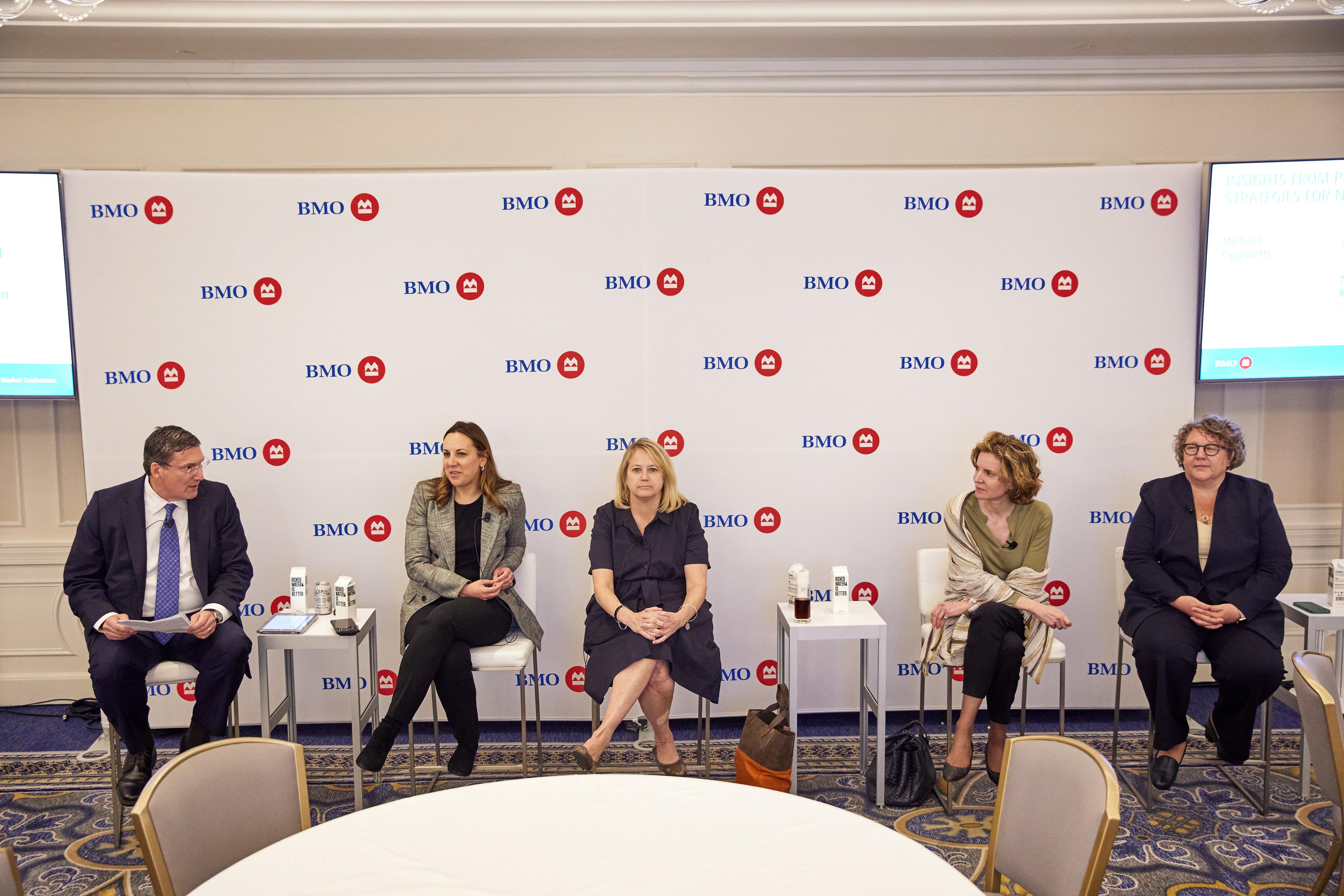Private equity firms are taking market uncertainty and higher capital costs in stride. While transaction levels are down year-over-year, PE firms remain committed to finding and creatively structuring deals that work for both buyer and seller in the current environment.
That was the central theme behind the Insights from Private Equity: Navigating Uncertainty panel at the BMO Capital Markets 18th annual Farm to Market Conference in New York. The panel led by Michael Cippoletti, Managing Director & Head of Food, Consumer & Retail for BMO Capital Markets, featured Jennifer Davis, Partner at Bain Capital; Nathalie Kosciusko-Morizet, Senior Partner at Antin Infrastructure Partners; Kelly Thomson, Head of Capital Markets, Mubadala Capital and Jennifer Kloud, Head of Originations, BMO Sponsor Finance.
Private Equity is Rethinking Its Approach
The environment is leading to tighter terms and higher pricing, said Jennifer Kloud.
But, while the economic headwinds are changing how private equity looks at the market, she said the financial firm is not changing the types of companies it wants to support. “The one thing I love about the businesses to which we lend is they have staying power, and they’re great companies, despite what’s going on around them,” said Kloud.
Bain’s Jennifer Davis agreed that the headwinds, such as rising interest rates, are not deterring their approach to the market. “We’re actually ‘risk on’ right now,” she said, noting that the pressures are different depending on where the companies are or what product categories they serve. “It’s a time for us to have some differentiated shots on goal that maybe others are shying away from.” Still, she added, investment committees have become more granular in evaluating oppportunities, particularly in the presented downside scenarios presented.
Taking a Measured Approach
Firms like Mubadala Capital the wholly owned asset management subsidiary of Abu Dhabi sovereign wealth fund Mubadala Investment Company, see the market similarly. As a result, Thomson said that when seeking debt capital, they can adopt a more conservative stance than usual. For example, when direct lenders offered six times leverage, Mubadala sought leverage in the range of four and a half or five.
Thomson said that in the past, private equity firms were willing to aggressively fund growth capex before looking to sell; that strategy has moderated in the current market. “Having a CFO who can go on that strategic thought journey with you, I think, is increasingly important,” she said.
Even though Mubadala Capital is backed by a US$267 billion sovereign wealth fund that gives it a lot of flexibility, it’s still taking a measured outlook on the markets. “Having a conservative outlook and a little bit more flexibility on the funding side gives usmore comfort to invest in this particularly challenging environment,” said Thomson.
Looking for the Exit
It’s a different matter for exits, however, where Bain Capital remains patient in picking optimal windows to sell assets. “We certainly want to pursue an exit for something in our portfolio at the right time for that business and its history and that we feel like we’ve extracted a lot of value,” Davis said. “Hopefully, the next owner can extract value as well.” If you want to try and sell a company, then you have to be willing to be patient, with a view of taking an additional six months to two years before launching a potential exit, she added.
Pricing deals is a challenge, too, said Antin Infrastructure Partners’ Nathalie Kosciusko-Morizet. She said comparables from a year ago are of little use when setting a price because the market has moved so much. “We’re spending more time trying to figure out how to be thoughtful in terms of coming up with where we think things are going to sell,” she said.
Partnering Up
While Davis said, Bain Capital is open to doing deals, rising interest rates have put pressure on financial sponsors who are asking to extend their fundraising period because they are not reaching their hurdles fast enough. Rather than having one main investor, she said it’s resulting in more syndicated deals.
“We’re clubbing up with our friends again,” she said. “It’s not a fundamental issue with the business, and we found most -sponsors to be supportive.”
Using earnouts to help make deals more affordable has also been another tactic used more frequently by private equity since debt is becoming more expensive. Thomson said Mubadala Capital is very open to this approach. “We’re always glad to partner with sellers on upside capture, particularly if they’ve recently made an acquisition, and projections may be more opaque,” she said.
While companies and private equity markets are adapting to the market, Kloud said a quality company will always be able to attract investment. “A good company is a good company,” she said. “We want to lend to a good company regardless of where we are in the economic cycle.”
